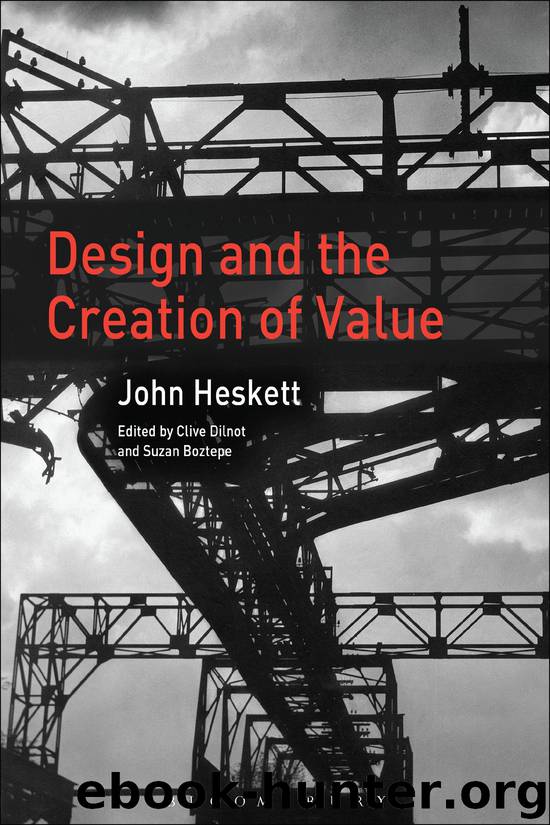Design and the Creation of Value by John Heskett Clive Dilnot Suzan Boztepe

Author:John Heskett,Clive Dilnot,Suzan Boztepe
Language: eng
Format: epub
Publisher: Bloomsbury UK
FIGURE 5.3 New Growth theory in the expanded model.
Modern economists have become aware of major differences across nations in institutions – differences that seem to have a large impact - and thus have become more aware that in some countries the processes that guide the evolution of institutions seem to be more effective than in other countries. They also have come to understand that these processes are very complex and poorly understood. Acquiring a good understanding of institutions is going to be harder than acquiring a better model of technological change, or firm capabilities and their dynamics, simply because institutions are so diffuse.33
In addition to neglecting institutions, Nelson is also highly sceptical about the way work in growth theory emphasizes a search for formal models that can be mathematically based. In joint work with Sidney Winter,34 Nelson proposed that theorizing has two broad levels:
What we called ‘appreciative theorizing’ tends to be close to empirical work. Mostly it is expressed verbally and is the analyst’s articulation of what he or she thinks is actually happening.35
In contrast, formal theorizing almost always proceeds at some intellectual distance from what is known empirically. Where it does appeal to data for support, the appeal generally is to ‘stylized facts’ or reasonably good ‘statistical fits’. If the hallmark of appreciative theory is storytelling that is close to the empirical details, the hallmark of formal theorizing is an abstract structure set up to enable one to explore, find and check proposed logical connections. Good formal theorizing is less likely than appreciative theorizing to contain logical gaps and errors. Nelson summarizes:
[Winter and I] proposed that, when the intellectual enterprise in economics is going well, empirical research, appreciative theorizing, and formal theorizing should work together. More explicitly, empirical work and appreciative theorizing should work together, and appreciative and formal theorizing should work together.36
The relationships between empirical work, appreciative theory and formal theory are obviously crucial in defining the dominant ideas and practices in the profession of economics. Nelson is critical of New Growth theory, because although widely argued to be a break with tradition, it has in fact great continuity with it, particularly in its tendency to make modifications of and additions to formal theory, rather than looking outside its confines. Nelson believes that appreciative theory, searching where formal theory does not venture, provides the most promising avenues for research. He suggests three broad areas of focus:
1 The nature of technology and the processes driving technological advance;
2 The factors influencing the behaviour and effectiveness of firms and other organizations that employ technology and produce the goods and services that count as economic output;
3 The institutions that surround, support and constrain firms.37
For Nelson, ‘The highest priority is to develop a broad theory of growth capable of taking in and integrating the kinds of understanding about these variables.’38 New growth theories with their emphasis on formalization are, he believes, of little help in this endeavour, and indeed, the stress on formalization, with its difficulties in handling relationships and large numbers of
Download
This site does not store any files on its server. We only index and link to content provided by other sites. Please contact the content providers to delete copyright contents if any and email us, we'll remove relevant links or contents immediately.
POP by Steven Heller(3362)
Japanese Design by Patricia J. Graham(3178)
The Power of Broke by Daymond John(2988)
Architecture 101 by Nicole Bridge(2804)
Indistractable: How to Control Your Attention and Choose Your Life by Nir Eyal(2388)
Fusion 360 for Makers by Lydia Sloan Cline(2359)
Batik by Rudolf Smend(2185)
Actionable Gamification: Beyond Points, Badges, and Leaderboards by Yu-kai Chou(2159)
Origami Art by Michael G. Lafosse & Richard L. Alexander(2097)
Homebody by Joanna Gaines(2068)
Whiskey in a Teacup by Reese Witherspoon(1982)
Worn in New York by Emily Spivack(1963)
Feng Shui by Stephen Skinner(1941)
Austin Kleon by Steal Like an Artist(1937)
Simple Gatherings by Melissa Michaels(1900)
Don't Make Me Think, Revisited: A Common Sense Approach to Web Usability by Steve Krug(1864)
Ryan Korban by Ryan Korban(1767)
The Joy of Hygge by Jonny Jackson(1744)
Hygge: The Danish Art of Happiness by Marie Tourell Søderberg(1729)
